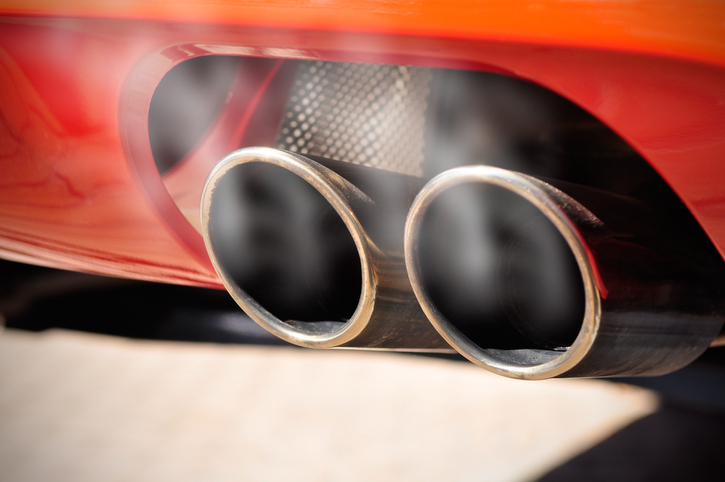Lately there has been increasing concern about the impact each of us has on our environment. Often this can lead to a battleground of debate, but one thing is certain: Internal combustion engines create pollutants. Fortunately, there are actions we can take to limit those emissions and the impact they have on our lives and our planet.
What are emissions?
With any internal combustion engine, flammable fuel is mixed with oxygen, usually from the air we breathe, and combined under pressure and with a regulated spark to create a controlled explosion. The force this explosion generates creates expansion, which moves a piston, which moves a crankshaft, which is used to create motion. And down the road you go.
There are two primary byproducts of this process of changing chemical energy into kinetic energy: heat and exhaust. The chemical process of combustion itself–known as oxidation–turns a hydrocarbon, such as gasoline, into carbon dioxide, carbon, and a variety of other gases and particles known as “emissions.” Other trace elements and compounds include sulfur, hydrogen sulfide, ozone, carbon monoxide, and even unburned fuel.
How do emissions impact the environment?
Not only are the emissions your running vehicle creates foul-smelling, they are also toxic. Large particulates found in smoke and exhaust create smog in cities, which contributes to acid deposition in rainwater. In addition to being difficult to breathe, smog also corrodes metal and even stone. In highly concentrated amounts, carbon monoxide is particularly lethal to people and animals. Carbon dioxide is considered a greenhouse gas and could affect atmospheric conditions, and the massive amounts of carbon in the atmosphere could contribute to climate change. Atmospheric pollutants are a big contributor to increased greenhouse gases, which are being produced faster than they can be reclaimed by plants or the oceans. All the carbon that was trapped in oil and other hydrocarbons for the last several million years is being released in record amounts by burning fuel. In the last thirty years, significant efforts have been made to reduce and eliminate these gases in automobiles as much as possible. As a result, most cities – particularly those outside of Asia – a experiencing less pollution than they did decades ago. Still, emissions levels remain a significant threat to the environment.
What can you do to reduce your vehicle emissions?
There are a number of ways you can reduce your environmental impact by reducing emissions. Some of them are so simple they might be surprising.
-
- Premium gasoline: Especially in newer cars and vehicles that require high-octane fuels, premium fuels reduce premature ignition of fuel and therefore make for more complete oxidation of fuel and more efficiency in fuel consumption.
- Oil changes: Regular oil changes remove bits of dirty, microscopic metal shavings, and debris from the moving parts of your powertrain. This increases efficiency and reduces wear on your engine, and reduces smoke and emissions.
- Air filter change: By replacing your air filter regularly, you can increase the ease by which clean air flows into your intake. When engines have to work less hard, they work more efficiently and produce less exhaust.
- Tire pressure: Good tire inflation means less drag on the road, which means your motor doesn’t have to work nearly as hard to get you down the road. This improves your MPG as well as reducing emissions.
- Reduce idle time: In the past, idling your vehicle was important for consistent performance, but now, with improved fuel injection, air intake, and electronically controlled ignition, turning your vehicle off is preferable to letting it idle. This will further reduce fuel consumption and emissions.
- Driving style: Steady, consistent speeds will show a dramatic increase in MPG and hence reduce emissions. In contrast, aggressive driving burns more fuel and produces more pollution.
- ELEV8 Powertrain Treatment: ELEV8 significantly reduces friction by filling in the spaces and microscopic imperfections in the moving parts of your powertrain (your engine, transmission and differential). Its specially designed formula bonds with moving metal parts such as gears and cranks inside your motor to deliver higher performance and reduce drag— much more effectively than motor oil alone! By reducing friction, you increase both horsepower and fuel efficiency, especially when hauling loads such as trailers or boats. ELEV8 has been shown in case studies and laboratory studies to increase horsepower and torque and reduce wear much more effectively than other engine and powertrain treatments. Case studies also show that ELEV8 significantly improves mileage, which means a significant reduction in emissions as well as significant cost savings!
The ELEV8 Difference
Usually increasing horsepower means reducing your mileage, but not with ELEV8. Independent studies prove that ELEV8 increases horsepower and mileage! And remember, increased mileage means reduced emissions. What’s more, ELEV8 has also been proven to reduce powertrain wear. This means you can not only reduce maintenance expenses, you can extend your vehicle life by one year, two years or more! So choose the revolutionary powertrain treatment proven to protect your vehicle, your bank account and your planet. Choose ELEV8!

